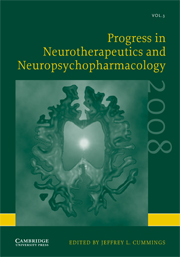Book contents
- Frontmatter
- Contents
- Contributors
- Progress in Neurotherapeutics and Neuropsychopharmacology 2008
- Triflusal versus Aspirin for the Prevention of Stroke
- The Argatroban and tPA Stroke Study
- Use of Selegiline as Monotherapy and in Combination with Levodopa in the Management of Parkinson's Disease: Perspectives from the MONOCOMB Study
- Ropinirole 24-h Prolonged Release in Advanced Parkinson Disease: Review of a Randomized, Double-Blind, Placebo-Controlled Study (EASE PD-Adjunct Study)
- Insulin Resistance Alzheimer's Disease: Pathophysiology and Treatment
- Targeting Amyloid with Tramiprosate in Patients with Mild-to-Moderate Alzheimer Disease
- Intranasal Zolmitriptan Is Effective and Well Tolerated in Acute Cluster Headache: A Randomized Placebo-Controlled Double-Blind Crossover Study
- Optimal Dosing of Immunomodulating Drugs: A Dose-Comparison Study of GA in RRMS
- Tetrathiomolybdate versus Trientine in the Initial Treatment of Neurologic Wilson's Disease
- Randomized Clinical Trials of Pregabalin for Neuropathic Pain: Methods, Results, and Implications
- Effect of Methylphenidate in Patients with Acute Traumatic Brain Injury; a Randomized Clinical Trial
- Improvement in Speeded Cognitive Processing After Anti-epileptic Drug Withdrawal–A Controlled Study in Mono-therapy Patients
- A Randomized-Controlled Trial of Bilateral rTMS for Treatment-Resistant Depression
- Serotonin Related Genes Affect Antidepressant Treatment in Obsessive–Compulsive Disorder
- Night Eating Syndrome and Results from the First Placebo-Controlled Trial of Treatment, with the SSRI Medication, Sertraline: Implications for Clinical Practice
- Modafinil: A Candidate for Pharmacotherapy of Negative Symptoms in Schizophrenia
- New Approaches to Treatment of Schizophrenia by Enhancing N-methyl-D-aspartate Neurotransmission
- Subject Index
- Author Index
Improvement in Speeded Cognitive Processing After Anti-epileptic Drug Withdrawal–A Controlled Study in Mono-therapy Patients
Published online by Cambridge University Press: 13 May 2010
- Frontmatter
- Contents
- Contributors
- Progress in Neurotherapeutics and Neuropsychopharmacology 2008
- Triflusal versus Aspirin for the Prevention of Stroke
- The Argatroban and tPA Stroke Study
- Use of Selegiline as Monotherapy and in Combination with Levodopa in the Management of Parkinson's Disease: Perspectives from the MONOCOMB Study
- Ropinirole 24-h Prolonged Release in Advanced Parkinson Disease: Review of a Randomized, Double-Blind, Placebo-Controlled Study (EASE PD-Adjunct Study)
- Insulin Resistance Alzheimer's Disease: Pathophysiology and Treatment
- Targeting Amyloid with Tramiprosate in Patients with Mild-to-Moderate Alzheimer Disease
- Intranasal Zolmitriptan Is Effective and Well Tolerated in Acute Cluster Headache: A Randomized Placebo-Controlled Double-Blind Crossover Study
- Optimal Dosing of Immunomodulating Drugs: A Dose-Comparison Study of GA in RRMS
- Tetrathiomolybdate versus Trientine in the Initial Treatment of Neurologic Wilson's Disease
- Randomized Clinical Trials of Pregabalin for Neuropathic Pain: Methods, Results, and Implications
- Effect of Methylphenidate in Patients with Acute Traumatic Brain Injury; a Randomized Clinical Trial
- Improvement in Speeded Cognitive Processing After Anti-epileptic Drug Withdrawal–A Controlled Study in Mono-therapy Patients
- A Randomized-Controlled Trial of Bilateral rTMS for Treatment-Resistant Depression
- Serotonin Related Genes Affect Antidepressant Treatment in Obsessive–Compulsive Disorder
- Night Eating Syndrome and Results from the First Placebo-Controlled Trial of Treatment, with the SSRI Medication, Sertraline: Implications for Clinical Practice
- Modafinil: A Candidate for Pharmacotherapy of Negative Symptoms in Schizophrenia
- New Approaches to Treatment of Schizophrenia by Enhancing N-methyl-D-aspartate Neurotransmission
- Subject Index
- Author Index
Summary
ABSTRACT
Background: Anti-epileptic drugs (AEDs) are associated with cognitive side effects. Doubt exists regarding the degree of cognitive effects primarily related to problems with design and methodology in many studies. The aim of the reported study was to assess the effect of AED withdrawal in patients on monotherapy using computerised measures of attention, reaction time and speed of information processing. Methods: One hundred and fifty patients seizure free >2 years on drug monotherapy went through a randomised, double blind, placebo controlled study. All patients were included for 12 months or until seizure relapse. Cognitive function was assessed with the California Computerized Assessment Package at baseline and 7 months after withdrawal. Results: The major finding was that discontinuation of major AEDs significantly improved performance on tests that require complex cognitive processing under time pressure. The difference in speed of cognitive processing between the withdrawal and non-withdrawal groups was between 24 and 43 ms.
No significant difference emerged between the groups on simple tasks of attention and reaction time. Most of the patients in the study were treated with carbamazepine and valproate. The outcome of carbamazepine withdrawal was similar to the outcome for the total study population while discontinuation of valproate only revealed a non-significant tendency in the same direction. Interpretation: The results suggest that seizure-free epilepsy patients on monotherapy can obtain improvement in speeded cognitive processing if they withdraw anti-epileptic treatment.
- Type
- Chapter
- Information
- Progress in Neurotherapeutics and Neuropsychopharmacology , pp. 199 - 210Publisher: Cambridge University PressPrint publication year: 2008
- 3
- Cited by

